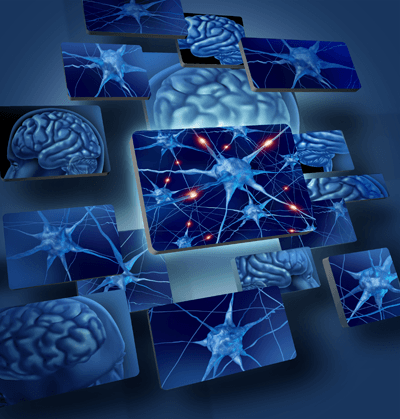Frequently Asked Questions (FAQ)
Biofeedback: Biological monitors reflect ongoing states of the nervous system and provide ongoing information to enhance self-regulation of the nervous system. Can include muscle tension, thermometers for hand warming, heart rate variability, EEG, etc.
EEG Biofeedback: Biofeedback that uses an EEG to monitor brain waves.
Neurofeedback: Biofeedback with any monitor of brain activity: EEG (brainwaves), HEG (Infra-red emissions), fMRI (functional Magnetic Resonance Imaging), MEG (magnetoencephalography), etc.
Neurotherapy: Various technologies to enhance brain function including biofeedback, neurofeedback, cranial electrical stimulation, direct current transcranial stimulation, pulsed electromagnetic frequencies, etc. I have all these devices.
No. The EEG just reads the brain waves you are making all the time. The only thing that goes into your eyes and ears is the audio-visual information designed to condition you to gently move you toward better brain wave patterns.
More than once a week. With twice a week, we normally see some improvement in your life within 5-8 sessions. More often is better. Even multiple one-hour sessions per day are great, if possible.
Most people need between 20-30 sessions of neurofeedback to complete a full course of treatment. We want to continue training a few sessions after significant benefits have slowed to ensure benefits last a lifetime.
You would not expect to walk out of the gym feeling stronger than you walked in. While some people experience a nice benefit within a session or two, don’t expect instant results. Brain wave training is practice with new patterns and it takes a 2-3 hours of practice before it shows up in your life. 5 sessions is 2 hours of training.
Busses don’t run on good schedules near me. You can get close on the 44 or 52, but will have to walk a mile for another connection. See Septa.org. I am at 28 Rock Hill Road, Bala Cynwyd, PA 19004.
A survey says half of neurofeedback patients take at least one medication. After 20 sessions 75% have reduced or eliminated their medications.
As neurofeedback corrects the underlying pathology in the brain and symptoms improve, any psychotropic medication you are taking will become an overdose. Consult your prescribing physician.
No. This is actually unethical. There is a professional prohibition against a dual relationship. Whether paid or unpaid, I cannot ethically ask my patient to also be a sales agent for me. Even if we all want to. I wish I could provide you an external reassurance and the comfort of another voice, but that would be an ethical violation, sorry.
Anybody can do neurofeedback at any time. There are no contraindications. That means even pregnant women can do biofeedback and are encouraged to do it so they can reduce or eliminate medications for conditions such as migraine.
Those who have just suffered a traumatic brain injury do not have to wait before doing EEG biofeedback.
Are you a good candidate for biofeedback? Most everybody is. Only 5% of people get no benefit at all.
Here are the issues that I’ve had successful experience with since 2003:
- Arousal: stress, anxiety, headache, OCD – obsessionality, anger, PTSD, psychological trauma, phobias.
- Optimal functioning: students, meditators, performing artists, athletes, soldiers, executives.
- Everybody: IQ, sleep, mental focus, memory, emotional health, personality factors.
- Brain: seizures, stroke, traumatic brain injury, coma, migraine.
- Lifestyle: drug & alcohol abuse, criminality, eating disorders.
- Chronic: asthma, Lyme, IBS, TMJ, chronic fatigue, immune suppression, fibromyalgia.
- Not just kids: ADHD, autism, Asperger’s, Tourette’s, tics, learning disorders.
- Women: PMS, menopause, hot flashes, infertility.
- Major: cancer, obesity, diabetes, hypertension, chronic pain, depression.
Things biofeedback is NOT good at healing.
Smoking cessation, most obesity, stuttering (stammering is easier).
Discipline and conscientiousness are core personality traits. Attention deficits can be improved, but there are hard limits to changing personality.
Yes, but.
OCD, Autism, IDD (mental retardation). Neurofeedback does work very well, but it takes longer than normal.
Coma (we can sometimes do it, but it is not an office visit.)

Brain Waves and Symptoms
Psychological issues are linked with too much brain wave power or too little power at various frequencies. If you balance the brain waves with neurofeedback, the issues decrease.
Slow Delta/Theta Imbalance
- Cognitive Impairment
- Impulsivity
- Hyperactivity
- Focus and Attention Issues
- ADHD
- Socially Inappropriate
- Easily distracted
- Excessive Speech
- Disorganized
- Hyper-emotional
- Traumatic Brain Injury
- Dementia
- Learning Disorders
- Autism / Asperger’s
Medium Alpha Imbalance
- Depression
- Victim Mentality
- Excessive Self Concern
- Passive Aggressive
- Irritability
- Avoidance Behavior
- Rumination
- Anger
- Self-Deprecation
- Agitation
- Fibromyalgia
- Withdrawal Behavior
Fast Beta Imbalance
- Anxiety
- OCD
- Migraine
- Tension Headaches
- Insomnia
- Obsessive Thinking
- Excessive Rationalization
- Poor Emotional Self-awareness
- Panic Attacks
- Worry
- Chronic Pain
- Hyper-vigilant
- Dislike Change
Research
What is Neurofeedback An Update
https://www.researchgate.net/publication/254373196
Neurofeedback Gains Popularity and Lab Attention
https://www.nytimes.com/2010/10/05/health/05neurofeedback.html
What is Neurofeedback
https://www.psychologytoday.com/us/blog/the-resilient-brain/201410/
Positive Feedback
https://www.apa.org/monitor/2016/03/cover-feedback.aspx
The International Society for Neurofeedback and Research
https://www.isnr.org/
An interview with Bill Scott, the Developer of BrainPaint
https://biofeedbackneuroscience.com/wp-content/uploads/newsletters/2014/bsc_spring_2014_press.pdfbesselvanderkolk.net.
Simple explanations in parent magazine by prominent clinician/researcher.
https://www.additudemag.com/basics-neurofeedback-for-adhd/
“I used to have mental problems that would consume my life.
But now I’m just living a great life.”
“I used to have a slew of problems.
Those are gone now and I have moved on.”
“I have grown so much over the past 2 months.
This freedom is wonderful.”
“I can’t believe how much this biofeedback helped me overcome that head trash.
Life is so much better now.”
“Biofeedback has been great for me.
It really worked to overcome my issues.”
“This is amazing. I feel so good every time we are done with a session.
Such a huge impact on my life. Thank you.”